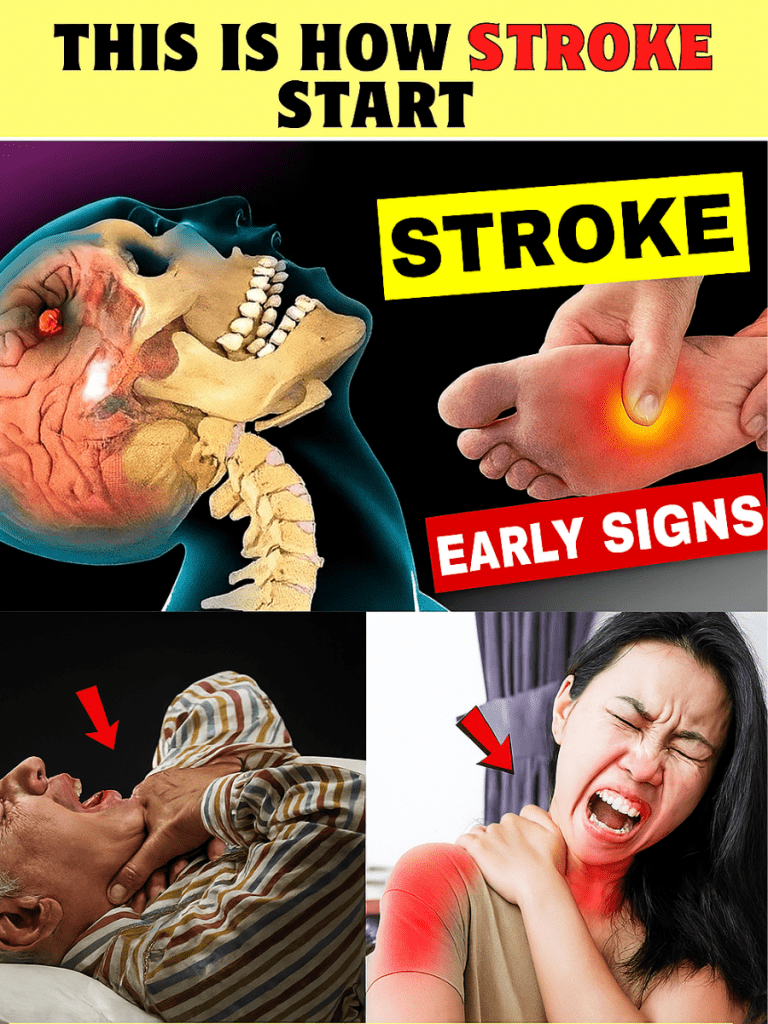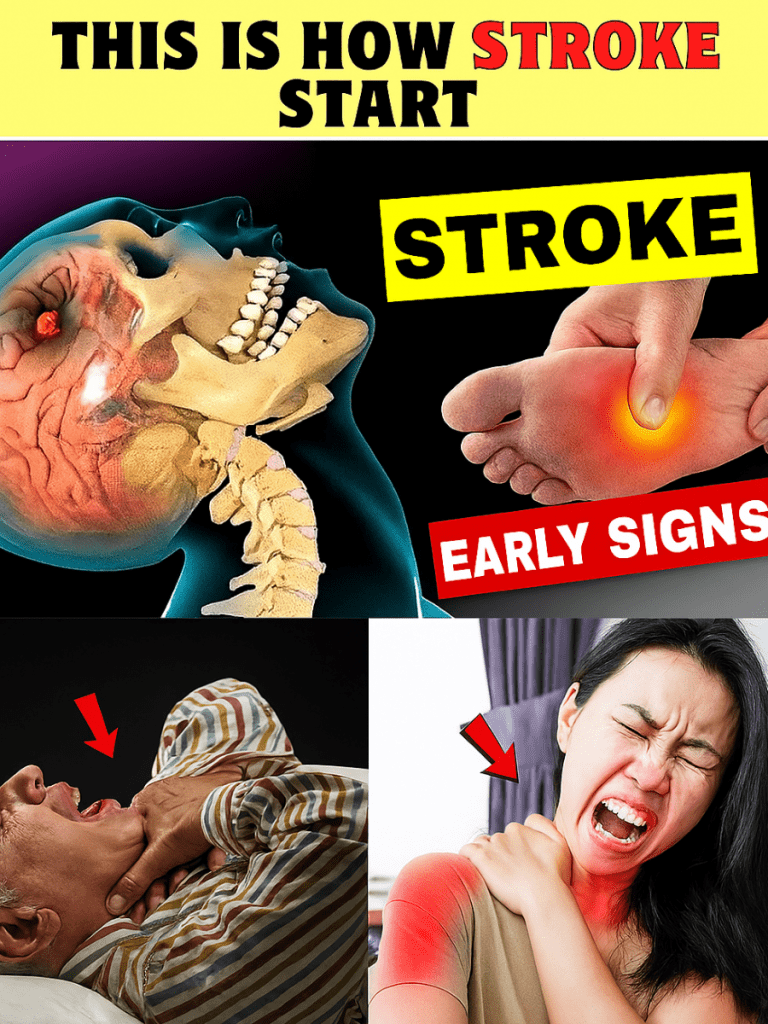Imagine this: your body is trying to warn you of a life-threatening event, but you’re missing the signals. A stroke can strike without warning, yet it often sends subtle clues up to a month in advance. These whispers from your body could be the difference between life and death. If you or someone you love is at risk, you can’t afford to overlook these early red flags.
In this comprehensive guide, we’ll uncover the 8 critical warning signs of a stroke that could appear weeks before it happens. Plus, we’ll arm you with 9 powerful, science-backed strategies to prevent a stroke naturally. This isn’t just another health article—it’s a wake-up call to take control of your brain health and protect your future. Let’s dive in and empower you to act before it’s too late.

🧠 Why Early Detection Could Save Your Life
A stroke occurs when blood flow to your brain is interrupted, starving brain cells of oxygen and nutrients. Within minutes, brain damage can begin. Every second counts, but what if you could spot the warning signs weeks in advance? By recognizing these subtle symptoms and making proactive lifestyle changes, you can dramatically reduce your risk. Knowledge is power, and this article is your roadmap to staying one step ahead of a stroke.
⚠️ 8 Silent Warning Signs of a Stroke You Can’t Ignore
Your body is always communicating, but are you listening? Here are the 8 early warning signs that could signal a stroke is looming. Pay close attention—these symptoms may appear up to a month before a stroke strikes.
- Frequent, Unusual Headaches
Persistent headaches that feel different from your usual tension or migraine pain could be a warning. These headaches may stem from restricted blood flow to the brain, a precursor to a stroke. If they’re recurring or paired with other symptoms, don’t brush them off. - Dizziness or Loss of Balance
Feeling lightheaded or unsteady for no apparent reason? Sudden dizziness or trouble maintaining balance could indicate problems with blood circulation in the brain. This is a red flag, especially if it happens repeatedly. - Unexplained Fatigue
Are you constantly exhausted, even after a full night’s sleep? Chronic fatigue that doesn’t improve with rest might mean your brain isn’t getting enough oxygen. This subtle sign could be your body’s cry for help. - Vision Disturbances
Sudden changes in your vision—like blurriness, double vision, or partial loss of sight in one eye—can signal a stroke on the horizon. These issues often come and go, making them easy to dismiss, but they’re critical to address. - Difficulty Speaking or Understanding
Struggling to find words, slurring your speech, or having trouble understanding conversations? These could be early signs of a mini-stroke (transient ischemic attack) or a warning of a larger stroke to come. Act fast if you notice this. - Numbness or Weakness on One Side
Tingling, weakness, or numbness in your face, arm, or leg—especially on one side of your body—is a hallmark stroke warning. Even mild symptoms should never be ignored, as they could indicate a mini-stroke that foreshadows a major event. - Memory Lapses or Confusion
Sudden forgetfulness, trouble concentrating, or feeling mentally foggy could point to disrupted brain function. If these issues arise out of nowhere, they’re worth investigating. - Unexplained Mood Swings
Are you feeling unusually irritable, anxious, or emotionally unstable? Sudden mood changes without a clear cause could reflect early changes in brain circulation. Paired with other symptoms, this is a sign to take seriously.
These warning signs are your body’s way of sounding the alarm. Don’t wait for them to escalate—early action can be a lifesaver. If you experience any of these symptoms, consult a healthcare professional immediately. But prevention is even better, so let’s explore how to stop a stroke before it starts.
🛡️ 9 Powerful Strategies to Prevent a Stroke Naturally
The good news? Up to 80% of strokes are preventable with the right lifestyle changes. By adopting these 9 science-backed strategies, you can protect your brain, strengthen your heart, and lower your stroke risk significantly. Start today, and your future self will thank you.
- Take Control of Your Blood Pressure
High blood pressure is the leading cause of stroke, silently damaging your blood vessels over time. Aim for a healthy range (below 120/80 mmHg) by monitoring your levels regularly. Reduce salt intake, eat potassium-rich foods like bananas and spinach, and consult your doctor about medication if needed. - Fuel Your Body with a Brain-Protecting Diet
What you eat directly impacts your stroke risk. Load up on whole foods like leafy greens, berries, fatty fish (rich in omega-3s), nuts, and seeds. These foods reduce inflammation and support healthy blood vessels. Cut back on processed foods, trans fats, and added sugars, which can clog arteries and spike blood pressure. - Move Your Body Daily
Exercise is a stroke-prevention powerhouse. Just 30 minutes of moderate activity—like brisk walking, cycling, or swimming—five days a week can improve blood flow, lower blood pressure, and strengthen your heart. Find an activity you love, and make it a habit. - Kick the Smoking Habit
Smoking doubles your stroke risk by damaging blood vessels and increasing clot formation. Quitting is one of the most powerful steps you can take. Within just a few years of stopping, your risk drops significantly. Seek support from cessation programs or apps to make the process easier. - Limit Alcohol for a Healthier Brain
Excessive alcohol consumption raises blood pressure and stroke risk. Stick to moderate drinking: one drink per day for women, two for men. Better yet, swap cocktails for hydrating options like herbal tea or sparkling water with lemon. - Manage Diabetes Effectively
Uncontrolled diabetes damages blood vessels, making strokes more likely. Monitor your blood sugar regularly, follow a balanced diet, and adhere to your doctor’s recommendations for medication or insulin. Keeping diabetes in check is a critical step in stroke prevention. - Tame Stress for a Healthier Heart
Chronic stress fuels inflammation and elevates blood pressure, both of which increase stroke risk. Incorporate stress-relief practices like meditation, deep breathing, yoga, or even a daily walk in nature. Even 10 minutes a day can make a difference. - Keep Cholesterol in Check
High levels of LDL (“bad”) cholesterol can clog arteries, setting the stage for a stroke. Opt for heart-healthy fats like olive oil, avocados, and nuts while cutting back on fried foods and processed snacks. Regular cholesterol screenings can help you stay on track. - Stay Hydrated for Better Blood Flow
Dehydration thickens your blood, making clots more likely. Aim for at least 8 cups of water daily, more if you’re active or live in a hot climate. Keep a reusable water bottle handy to make hydration a seamless part of your routine.

💡 Why These Steps Matter More Than You Think
Every choice you make today shapes your brain’s future. A stroke can rob you of your independence, your memories, and your quality of life—but it doesn’t have to. By listening to your body’s early warning signs and committing to these prevention strategies, you’re investing in a healthier, longer life.
Think about it: a few small changes—like swapping processed snacks for fresh fruit, taking a daily walk, or checking your blood pressure—could prevent a catastrophic event. These aren’t just tips; they’re tools to empower you to take charge of your health.
🌟 Your Next Steps: Act Now, Protect Your Future
Don’t wait for a wake-up call. If you’ve noticed any of the 8 warning signs—headaches, dizziness, numbness, or confusion—schedule a check-up with your doctor today. Share this article with loved ones to spread awareness and protect those you care about.
Start incorporating the 9 prevention strategies into your daily routine. Pick one or two to focus on this week, like adding more vegetables to your plate or setting a reminder to drink water. Small, consistent steps lead to big results.
Your brain is the command center of your life. By staying vigilant and proactive, you can keep it sharp, healthy, and resilient for years to come. Act now—because your future is worth protecting.









